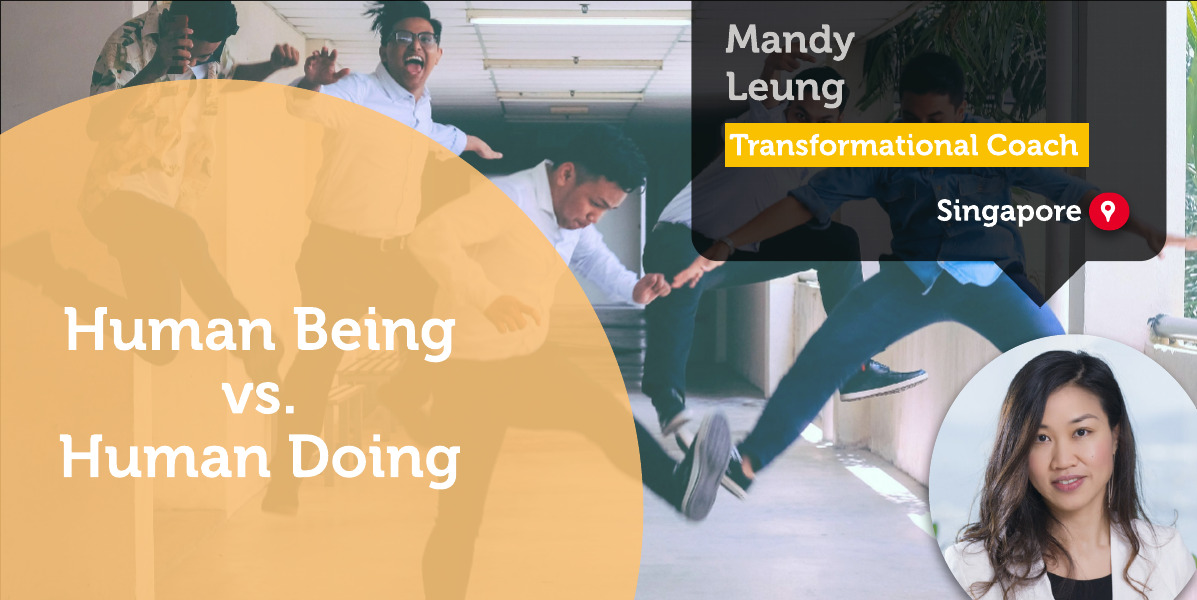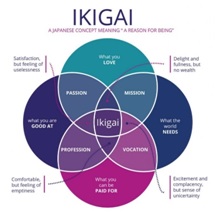A Coaching Power Tool By Mandy Leung, Transformational Coach, SINGAPORE

The Idea of Human Being vs. Human Doing
I am a human being, not a human doing. Kurt Vonnegut Jr.
Overpower of Social Media. We live in a generation where social media control our lives, our minds, and our thoughts. We are not able to fully enjoy eating out or other social activities because we are busy handling and posting on social media. We also suffer from they-are-doing-well-syndrome, when we see other people enjoying their life and posting photographs of various activities, they are involved in. People focus on editing and creating the perfect images of themselves to show their friends, families, or strangers on Instagram. They want to show others how many workouts they do and how nice their body figure is, or how perfect their relationships are. We are truly obsessed with attention on social media and many teens suffer from anxiety, depression, cyberbullying, and low self-esteem.
Money Culture. In China, we are being told that a man’s success depends on his profession and how much income you earn. I remember the first time I introduced my fiancé (now my husband) to my parent. Immediately my mom asked 2 questions: “What does he do for a living? How much does he make?”. We are constantly chasing to pursue higher qualifications at elite universities or jobs with higher income and accelerated progression.
Fear of Other People’s Opinions (FOPO). We crave social approval and a strong desire to fit in. We are worried or fear being ridiculed or rejected. How does this translate into our behavior? We don’t dare to raise our hand in a big meeting, give our opinions, or even walk through a room of strangers. However, the fear of being disliked by someone undermines our ability to pursue our lives to the fullest.
Are we humans doing or human beings?
Try not to become a man of success but a man of value – Albert Einstein
Human Being vs. Human Doing Definition
What Is Human Doing?
Human doings take great satisfaction from being busy and productive. They enjoy having a list of “to-do” tasks, but they are upset until they have crossed every item off the list.
We also live in a world with overwhelming information at our fingertips. We need to chase targets and improve productivity and efficiency. Children also have an uncertain set of expectations from their parents, teachers, and societies.
However, have we paused a while and asked ourselves – “Are you fulfilling your inner purpose?” or “Are we living the life that other people expect?”
What Causes People to Be Obsessed With Human Doing?
Fear – True fear comes from self-protection instinct instead of wanting to let go. We fear that our loved ones will disappoint us if we don’t behave or do certain things in certain ways. We are fearful of being left out if we are not doing something like other people.
Validation – In a world of social media, we are constantly judged by others and judge other people’s lives. At the same time, we also want to portray ourselves and show the perfect parts of our lives. We want to have more “likes” on the Instagram pictures and have more validation of what we are doing and what kind of lifestyle we are pursuing. We are constantly seeking validation from others. At the same time, we are also constantly comparing ourselves with others. For example, comparing your life against an influencer’s social media feed is a trap for feeling like a failure.
Reacting – Imagine your friend, co-worker, or partner berating you about something you did that was unpleasing in their eyes, do you react in a way that might escalate into a full-blown contentious confrontation, or do you remain silent and accept it? Sometimes we intend to react to things/ people around us without thinking about the big picture or purpose.
Imposter Syndrome –When you experience your success you may find yourself thinking, “I am not worthy” or “I don’t deserve this.” Imposter Syndrome represents a conflict between your self-perception and the way how others perceive you. Imposter Syndrome mostly strikes high-performing people. The effect of imposter syndrome leads to creating stress and reduced effectiveness at work. For example, you don’t speak up in the meetings for fear of not having something “smart” enough to say and you might develop self-sabotaging coping strategies to cope with the fear of being a failure. Or you may feel that overworking is the only way to meet expectations because you perceive inadequacies in yourself and think that you’re not good enough.
What Is Human Being?
Human upholds their thoughts, their values, their self-esteem, and how they value themselves. They gain satisfaction from intangible things like being honest, considerate, and responsible.
It’s not enough to be busy, so are the ants. The question is, what are we busy about? — Henry David Thoreau
Set out what your future looks like whether in your career or personal life or both.
Living with purpose is to ask yourself what you are doing and whether it is coming from a place of love and compassion. The energy enriches our lives and those who we interact and engage with.
How to Become Human Being Again?
Ikigai is a Japanese term meaning a “reason for being”. It’s the reason why you wake up every morning. Knowing your purpose enriches your life and deepens its meaning of it.

What’s Your Ikigai?
According to the Japanese, everyone has an ikigai which means a reason for living. Finding it is the key to a happier and longer life.
Having a strong sense of ikigai – the place where your passion, mission, vocation, and profession interact. Your life is infused with meaning and joy. You can find a real purpose in life and the joy of being busy.
To live your life fully and subvert the superficial, Hector Graciamentioned that there are 3 discovery questions you need to ask yourself:
- What do you love?
- What you’re good at?
- What can you get paid for?
- What does the world needs?
Review your answers to those questions and look for the cross-sections between them. Are you surprised by what you see? Does your soul crave more meaning in your life? Get curious about what it might mean to explore what you’re truly passionate about.
Begin by making a list of things that are inside each component. By filling it with personal non-work-related stuff, you might uncover aspects in your life that are being neglected but could help you find fulfillment – as soon as they’re brought into your professional life.
Empower the Client to Focus on Human Being
As coaches, we can empower clients to make shifts from human doing to a human being. As a coach, we need to create an environment with psychological safety and allow our clients to be comfortable to share what they are struggling with now and help them find their inner purposes.
Focusing on Human beings to give more meaning to what our clients are doing and pursuing. Enabling them to leverage their strengths to accomplish what they are passionate about. Our clients can live their values which are aligned with their purpose and social responsibilities. The majority of adults spend one-third of their time at work. Are they working on something that they are good at or passionate about? Are they working on something that makes them energized? What if they can work for a paycheck with sense of purpose?
Your purpose in life is to find your purpose and give your whole heart and soul to it. – Buddha
Coaching is a two-way street. By supporting the clients to find their reason for being, I (as a coach) also find my reason for being.
References
Parenting: Raise a Human Being, Not a Human Doing by Jim Taylor
Human Being vs Human Doing by Gordon Brewer
Are you a Human Being or a Human Doing by Stephanie Marcotte
Ikigai Is The Japanese Method Of Determining Whether Or Not Your Work Will Fulfill You by Brianna Wiest
Ikigai The Japanese Secret to a Long and Happy Life by Hector Gracia
How to Stop Worrying About Other People Think of You by Michael Gervais